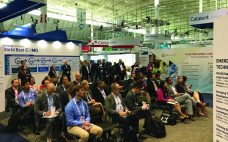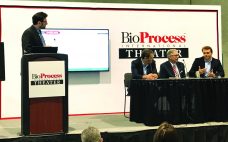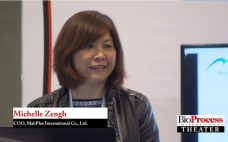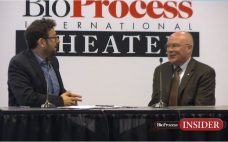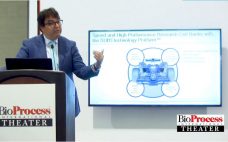Richard Grant, chief product officer, FloDesign FloDesign is experimenting with applications of acoustics to cell-therapy manufacturing. An electric transducer is attached to a closed-flow system and generates forward propagating waves that are reflected as backward propagating waves. This sets up three-dimensional standing waves within the cell (flow) chamber. When cells enter the flow channel, acoustic forces cause then to cluster within the nodes of those standing waves, ultimately settling out through enhanced gravitational means. Acoustic cell processing is scalable and…
Thursday, August 23, 2018 Daily Archives
Therapeutic Modalities: Business and Manufacturing Strategies Influencing Decisions to Develop One Therapy Type Rather Than Another
Moderator Patricia Seymour, with John Lee, Michael Kaufman, Jennifer Michaelson, and Weichang Zhou Following introductions of the panelists and their companies’ technologies, moderator Patricia Seymour began the discussion about challenges related to choosing different modalities and addressing related manufacturing concerns. Targeting Modalities Michaelson began by describing how Cullinan Oncology selects its targets and modalities, how it approaches those early phase decisions, and what its primary driver is to get into the clinic as quickly as possible. She talked about challenges…
Feeding the Demand for Cell and Gene Therapy Production
Moderator Dan Stanton, with Ohad Karnieli, Alan Moore, and David Brindley Moderator Dan Stanton introduced the second roundtable of Tuesday morning by commenting on the recent spate of approvals for CAR-T cell and gene therapies. With large biopharmaceutical and biotechnology companies devoting scientists and funds toward these next-generation therapies, contract manufacturing organizations (CMOs) also are investing in opportunities to expand capacity and expertise. As the panelists introduced themselves, they raised two key points for discussion: The contracting model for advanced…
The Development of a Next Generation Antibody–Drug Conjugate (ADC)
Michelle Zengh, chief operating officer, MabPlex International Company Ltd. MabPlex presents a complete solution from gene cloning to antibody–drug conjugate (ADC) fill–finish with a timeline from gene cloning to an investigational new drug application (IND) in 22 months. The company has facilities in San Diego and in China. It can perform cloning and high-yield stable cell-line development, process development and scale-up, CGMP quality and kilogram-scale monoclonal antibody (MAb) and payload manufacturing, large-scale conjugation (150–500 L), large-scale purification, formulation, and fill–finish.…
BioProcess Insider BPI Theater @ BIO 2018 – Wednesday Interviews
BioProcess Insider brings the news as it breaks. At the BPI Theater @ BIO, editor Dan Stanton conducted a series of interviews live on stage to report on the latest movements in the biomanufacturing industry to start each busy day of dealmaking in Boston. Below we summarize and share the videos from his DAY TWO conversations with a number of biopharmaceutical executives on Wednesday 6 June 2018. Sean Sommer, Vice President of Advanced Facilities, Jacobs Jacobs offers a range of services…
Rapid, Reliable Response to Biologic Drug Substance and Drug-Product Supply Challenges
Scott Battist, vice president, general manager, and site head for the drug substance plant, Emergent Bio BJ Hull, vice president, general manager, and site head for the drug product plant, Emergent Bio Willfredo Mateo, director of MS&T for the Camden fill–finish plant, Emergent Bio Emergent Bio started by producing treatments for an anthrax emergency. Traditionally, this has been a biodefense company with contracts from the US government. The company is focused on providing specialty products for civilians and military members…
Speed Matters: Gene to GMP in Nine Months
Igor Fisch, chief executive officer, Selexis, SA Fisch first posed this question: “How can we accelerate the number of drugs going into the clinics?” Speed matters because the faster a drug can get into clinical testing, the faster it can make it to market. He discussed both Selexis and KBI Biopharma and their collaboration, which started in 2012 when KBI developed a heterodimer purification process. JSR acquired both companies with an interest in entering the life sciences business. Selexis has…
Thinking Outside the Bag: Single-Use Technology Can Drive Innovation at the Benchtop Scale
Cristy Botens, product manager in bioprocessing, Distek Innovation is important, Botens began, and the focus should be on patients. Every innovation means that medicine gets to patients faster or has fewer side-effects. Recent pharmaceutical innovations include the first new Lupus treatment approved in 50 years, a gene therapy cure for inherited blindness, gene therapies for rare diseases, new chimeric antigen receptors on T cells (CAR-T) clinical trials (over 180 trials now), personalized cell therapy, and a vaccine that prevents cervical…
It’s All About Speed: Getting to Early Development Clinical Trials Quickly
David J. Kenyon, senior director of global scientific and technical affairs, Patheon (Thermo Fisher Scientific) Kenyon has over 25 years of experience in the pharmaceutical/biotechnology and vaccine industries. He began his career with Johnson and Johnson, where he managed the production of the first monoclonal antibody (MAb) approved for human therapy. He joined Patheon in 2014. Kenyon received his PhD from the Rutgers School of Medicine and Dentistry of New Jersey. Patheon is now part of Thermo Fisher Scientific. Thermo…
Using New Technologies to Compress Timelines, Increase Capacity, and Reduce Costs: Speed — Why, When, and How
Moderator Tom Ransohoff, with Jorg Thommes, Chris Love, Rajesh Beri, and Geoffrey Hodge For biopharmaceuticals to mature as a process industry, companies need to embrace the ability to adopt new technologies and bring new operational approaches to their biomanufacturing facilities. In this roundtable about adopting and implementing new technologies in the biologics industry, moderator Tom Ransohoff stressed the importance of understanding drivers for adopting new technologies and of developing enabling processes that factor in associated risks and challenges. He offered…

